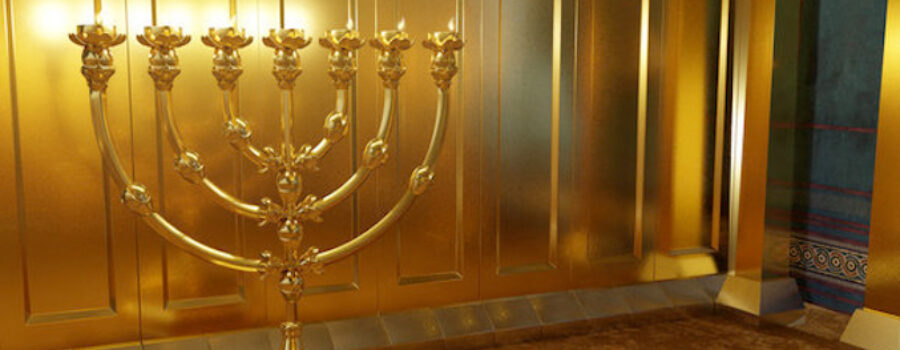To have a clear understanding of what a lampstand is—as used in the biblical accounts, and more so in the New Testament—a brief consideration of Luke 8:16 can be helpful. It reads:
No one, when he has lit a lamp, covers it with a vessel or puts it under a bed, but sets it on a lampstand, that those who enter may see the light.”
So here we have a lamp that has been lit; for a lamp per se cannot give light if it is not lit, and it cannot be lit if there is no oil in it—the parable of the ten virgins makes the concept clear enough. Secondly, the verse reveals the presence of two different entities, namely, the lit lamp and the lampstand. It follows that a lampstand per se cannot give light if there is no lit lamp on it, and the lit lamp cannot shine forth in its full potential without a lampstand.
Another thing to keep in mind is that not all the lampstands look as the one used in the sanctuary, i.e., the menorah, which was built to hold seven lamps. Some lampstands were built to hold a single lamp, while others were built to hold two, three or more.
You are the light of the world
In the Gospel of Matthew, Jesus attests that we are the light of the world, not merely the light of our home or of our church. Granted that to shine forth the life of God in our homes and churches is of sublime importance, yet it should not eclipse our true responsibility, which is: to be the light of the world, a world growing darker as the years pass by.
“You are the light of the world. A city that is set on a hill cannot be hidden” (Matt. 5:14).
The point Jesus is making is that to have a lit lamp is not sufficient. It must be put on a lampstand, otherwise the oil would not burn meaningfully. So on one side we have the lit lamp, and on the other side the lampstand, which main purpose is to manifest the light emanating from the lit lamp.
The removal of the lampstand
With this in mind, let us read the injunction given to the Ephesian church in the Book of Revelation:
Remember therefore from where you have fallen; repent and do the first works, or else I will come to you quickly and remove your lampstand from its place—unless you repent” (Rev. 2:5).
Here the question is: What is meant by “lampstand” in this verse? Happily, the Bible explains itself and Jesus leaves no room for doubts:
“The mystery of the seven stars which you saw in My right hand, and the seven golden lampstands: The seven stars are the angels of the seven churches, and the seven lampstands which you saw are the seven churches.” (Revelation 1:20)
So the lampstand at Ephesus was the actual church, but this conclusion must be understood properly otherwise wrong conclusions can ensue. Let me explain.
Revelation 2:5
When we say: “The lampstand refers to the church at Ephesus”, a problem seems to arise, which is provoked by the wording of Revelation 2:5, for it says, “or else I will come to you quickly and remove your lampstand from its place.” So here the possessive adjective “your” refers to whom? In other words, to whom did the lampstand belong? I suggest that the “your” in Revelation 2:5 must be understood at the light of the word “your” in verse 4: “Nevertheless I have this against you, that you have left your first love.” In this verse the word “your” obviously refers to the church at Ephesus, not merely to its angel. Since it is so, the word “your” in verse 5 must also refer to the church at Ephesus. Of course this interpretation begs the question: How can the lampstand belong to the church at Ephesus if, according to Rev. 1:20, the lampstand is the actual church at Ephesus”?
A plausible answer
The apparent contradiction is not as mysterious as it may appear. If I say, Donald Trump is the president of United States, most people will endorse what I say, but he is so called because of the office he occupies. Take his office away and he will no longer be the president of the United States. So we can affirm he is both, the president of United States but also the one to whom the presidency belongs. Likewise we can say: the church at Ephesus was the lampstand because its office was to manifest the Light of God. But here Jesus was threatening to take that office away from them if they didn’t repent. Was it to happen, the church at Ephesus would have continued to exist but without a lampstand.
Nowadays
I suggest that this is precisely the state of some evangelical churches nowadays. They exist, but they no longer shine forth the lit lamp of God, that is, they don’t expose anything and don’t bother anyone’s conscience. Consequently, everybody likes them—even those who work evil—and persecution is avoided altogether.
For everyone practicing evil hates the light and does not come to the light, lest his deeds should be exposed” (John 3:20).
Here we have the function of the lampstand, namely, to manifest the light in view to expose evil practices. But when this is no longer the case a church has lost much of its meaning. The tragedy resides in the fact that these Christians might not be aware of their loss. They might continue with the forms and rituals as if nothing has happened.
Decades ago, A.W. Tozer wrote: “If the Holy Spirit was withdrawn from the church today, 95 percent of what we do would go on and no one would know the difference.” The words of Tozer can be accepted or rejected, but surely they should prompt some reflection.
“Remember therefore from where you have fallen; repent and do the first works, or else I will come to you quickly and remove your lampstand from its place—unless you repent” (Rev. 2:5).














Leave a Reply
Your email is safe with us.